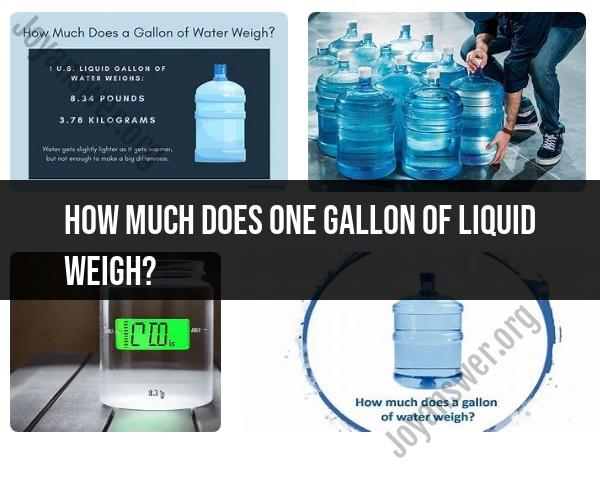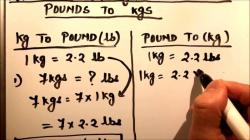How much does one gallon of liquid weigh?
The weight of one gallon of liquid depends on the density of the liquid. Density is defined as mass per unit volume. Different liquids have different densities, so the weight of one gallon (which is a measure of volume) will vary depending on the liquid.
To calculate the weight of one gallon of liquid, you need to know the density of the liquid in question. The formula to calculate the weight is:
For example, if you want to find the weight of one gallon of water, you would use the density of water, which is approximately 8.34 pounds per gallon (at 62°F or 17°C). So the weight of one gallon of water would be:
On the other hand, if you want to find the weight of one gallon of a different liquid with a different density, you would use the density of that specific liquid in the formula.
Here are the approximate densities of some common liquids at room temperature (varying slightly depending on temperature and pressure):
- Water: 8.34 pounds per gallon
- Milk: 8.6 pounds per gallon
- Gasoline: 6.3 pounds per gallon
- Olive oil: 7.6 pounds per gallon
- Honey: 12 pounds per gallon
Keep in mind that these are approximate values and may vary slightly depending on factors such as temperature and pressure. If you need the exact weight of a specific liquid, you'll need to use its precise density at the given conditions.
The Weight of Liquids: A Matter of Density
1. One Gallon's Worth:
The weight of one gallon of liquid depends entirely on the density of the liquid itself. A gallon is a unit of volume, not weight. However, we can estimate the weight by assuming we're dealing with water, the most common liquid reference.
- One gallon of water weighs approximately 8.34 pounds or 3.78 kilograms. This is because the density of water is about 1 kilogram per liter, and there are 3.785 liters in one gallon.
2. Density Matters:
Since different liquids have varying densities, their weight per gallon will differ:
- Milk: Slightly denser than water at around 1.03 kg/L, so a gallon of milk weighs roughly 8.6 pounds.
- Gasoline: Less dense than water at around 0.75 kg/L, resulting in a gallon weighing around 6.0 pounds.
- Vegetable oil: Similar to gasoline in density, with a gallon weighing around 6.0-6.5 pounds.
3. Weight in Different Industries:
Knowing a liquid's weight is crucial in various industries:
- Chemistry and physics: Precise measurements of liquid weights are essential for experiments, calculations, and understanding material properties.
- Food and beverage: Accurate weight control ensures consistent product quality, portion sizes, and recipe adherence.
- Engineering and construction: Calculating the weight of liquids is vital for designing pipelines, storage tanks, and transportation systems.
- Medicine and healthcare: Measuring the weight of administered fluids is crucial for patient care and dosage accuracy.
- Environmental science: Monitoring liquid waste or spills involves understanding their weight for proper containment and treatment.
By understanding density and its impact on weight, we can accurately assess and manage various liquids across diverse applications.












